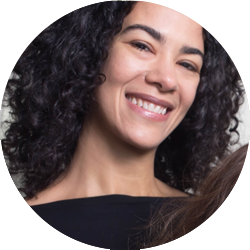“NAP STRUGGLE.” This is the title I’ve scribbled on a sheet of paper, unceremoniously ripped from a spiral notebook, and tacked to my fridge. It’s my latest plan to eliminate the repeated obstacles we have to napping. And to stop spending all dang day on trying to get a nap. The paper says:
G says she’s hungry soon after breakfast. Add fat and protein. [If she snacks through the morning, she’s not really hungry for lunch, and then I can’t tell if “I’m hungry!” protests at nap time are for real.]
Get more exercise in morning. Walk in park while L goes for run. [She certainly looks tired at nap time, but apparently she’s not tired enough to stay in bed when I put her there…]
Eat lunch about 11.
Poop is ruining nap. After eating, play without diaper. [Is it possible for a child to poop solely to get out of napping? I swear mine does.]
Recommendation is 5-6 hours awake [for 3-year-olds]. Start nap routine by 12:30 p.m.
Gets out of bed immediately. Read more stories to help settle, but change up routine (1 on couch, 2 in bed?).
End effort by 1:30.
This fabulous new and improved sleep schedule solves all of our apparent problems! Except one. And that’s probably why it’s not working.
My plan is all about the mechanics, the timing, the facts. I’ve forgotten about my daughter: how she feels about it.
A recent Motherlode column reminded me of this. In “Sleep’s Marketing Problem: You ‘Have to’ Go to Bed,” Heather Turgeon writes about the messages we send to our children about sleep — and how negative they tend to be. How “OK, time for bed” can be almost like a punishment we dole out. How our tone implies, even if subtly, that sleep is an undesirable thing. She writes:
“We’re late for bed,” or “We have to go to bed,” [parents say] with an anxious tone. Why couldn’t I say, with a welcoming tone, “We’re almost ready for cozy time, let’s go get snugly and warm …”
So in our house, the sleep attitude got a makeover. For me, it meant talking about sleep during the day — not as a looming requirement, but as the fascinating subject it is. … Breakfast conversation might include: Did you know that when you sleep, information is moved around in your brain? So the things you learned at school yesterday get to the right place in your mind for tomorrow. Or, children need more sleep than grown-ups because their brains and bodies are growing faster.
Why might this work?
A University of Michigan researcher studied the power of sleep knowledge with 152 low-income preschoolers. Over eight sessions in school, the 4-year-olds were taught about sleep habits: why animals and people need sleep; how reading is a more relaxing bedtime activity than watching TV; how 8 p.m. is a good bedtime. They did activities like practicing putting a teddy bear to bed; reading “Goodnight Moon”; and sequencing the steps in a bedtime routine. Parents set up a bedtime routine chart at home. (I talk about how to create such a chart in “Make bedtime less crazy” in Zero to Five: 70 Essential Parenting Tips Based on Science.)
A month after the training program, the parents’ sleep diaries showed, the kids in the study were getting 30 more minutes of sleep each weeknight. The interesting thing is that this change occurred even though the parents’ knowledge of sleep habits didn’t increase.
As Turgeon put it, “Research suggests that younger children who are taught sleep information and told why it’s important (rather than just being told to do it) sleep more, over all.”
People like to know why they should do things. In “Follow four rules about rules” in my book, I discuss the importance of explaining why. But I’d never connected that to sleep. And perhaps many of us parents don’t know how to answer the question “Why do we sleep?” — given that scientists don’t know that much about it. A few things they do know:
Sleep, scientists have discovered, not only restores and renews the body, but it also performs maintenance on the mind. It refines the memories formed during the previous day and makes preparations for the learning that will begin the next morning. Irrelevant memories are discarded and important memories are preserved, moved to the brain’s long-term storage to make room for new memories. Researchers have also found that newly learned information and skills are reinforced by a good night’s sleep — meaning that children are becoming better at their soccer footwork, their piano playing, or their times tables just by lying asleep in bed.
I’m going to try talking about the wonders of sleep, and not just at bedtime. I love Turgeon’s “rebranding” of sleep in her house as a pleasurable, cozy time — with the tone to match. Now if only we could rebrand brushing teeth. …
Written by
Tracy Cutchlow
Tracy is the author of the international bestseller Zero to Five: 70 Essential Parenting Tips Based on Science, a public speaker, and a creator of places to speak and be heard. Sign up for her newsletter here.


2 thoughts on “Are you giving sleep a bad name?”